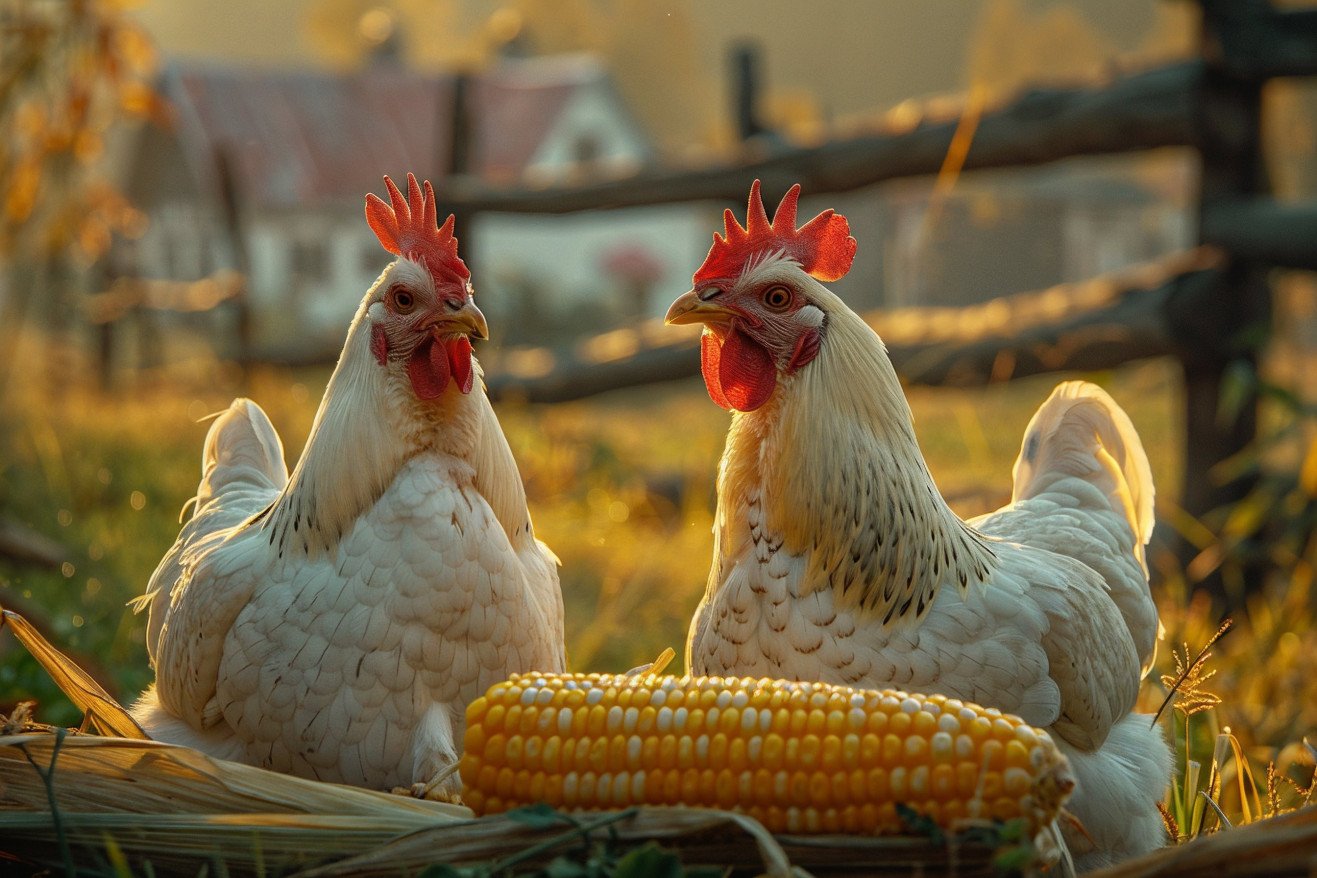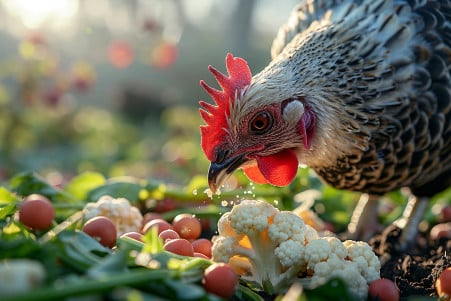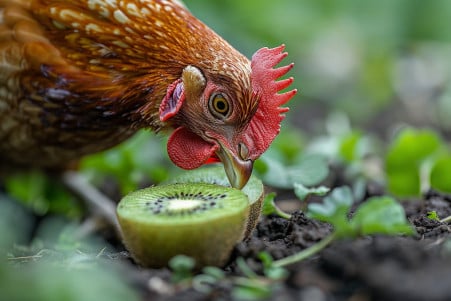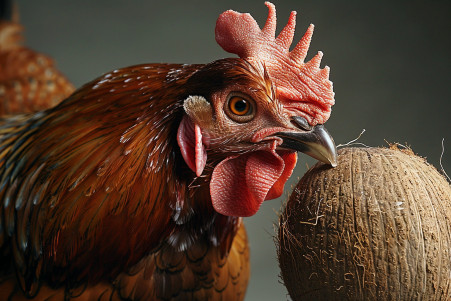Can Chickens Eat Corn Husks? A Guide to Feeding Your Flock Safely
9 March 2024 • Updated 9 March 2024

Chickens love to peck at grains, but can they add corn husks to their list of safe snacks? Chickens can eat corn husks, but they should be fed to them in moderation. Corn husks don’t have a lot of nutritional value, so they shouldn’t be used as a substitute for a well-rounded diet.
If you can, try to feed your chickens organic or pesticide-free corn husks. And to avoid choking and other digestive issues, make sure to cut the corn husks into small pieces.
To get a complete understanding of a chicken’s dietary needs and the potential hazards associated with feeding them certain foods, we’ve referenced a number of agricultural studies, nutritional analyses, and animal care recommendations.
We’ve looked at the role that corn husks can play in a chicken’s diet, their nutritional value, and the risks they may pose. Our goal is to give you a well-rounded view of what it means to feed your chickens corn husks.
Can chickens eat corn husks?
Nutritional Value of Corn Husks for Chickens
If used correctly, chickens can eat corn husks, which are more than just a by-product of corn processing. According to a thorough review published in PMC, corn husks are made up of cellulose, hemicellulose, and a small amount of protein. They are especially high in fiber, with 382 grams of cellulose and 445 grams of hemicellulose per kilogram of dry matter.
That said, they are not very nutritious overall, with lower protein and vitamin levels than other traditional feeds.
Corn husks are not a great source of protein, so they are not ideal as a main feed. However, they can provide some calories and nutrition when added to a varied diet. The review also explains that corn husks contain phenolic compounds like ferulic acid, which has antioxidant properties, but these are unlikely to benefit chickens unless the corn husks are processed in some way.
Poultry farmers need to be aware that corn husks can be used to supplement a chicken’s diet, but they should not be used as the main source of nutrition. Chickens need a well-balanced diet that includes vitamins, minerals, and high-quality protein to stay healthy and productive. Because they are not very nutritious, corn husks should be used as a treat that supplements a well-balanced poultry diet.
Walking the Line: Health Risks of Corn Husks in Chicken Diets
There are some health benefits to chickens, especially in terms of gut health, to eating corn husks. The high dietary fiber content of corn husks has been shown to have a number of positive effects on the gastrointestinal tract, including increasing the presence of beneficial gut bacteria and improving the functions of the digestive organs, according to the Journal of Animal Science and Biotechnology.
However, this is not to say that the risks of feeding chickens corn husks should be overlooked.
If the husks are not properly prepared, they can cause serious choking and digestive impaction issues. A study cited by the Journal of Veterinary Diagnostic Investigation found that backyard poultry were experiencing gastrointestinal impactions from eating fibrous materials, including corn husks, when proper precautions were not taken.
Furthermore, the fiber in corn husks can have an impact on the gut microbiota; while it can help create a healthy microbial environment, it can also lead to an overgrowth of certain bacteria if it’s not in the right balance.
To make sure that corn husks are safe for your chickens to eat, make sure to chop them up finely to prevent choking and only offer them in small amounts to prevent digestive issues. If you follow these precautions, you can give your chickens an occasional treat of corn husks without worrying about their health and well-being.
How to Properly Prepare Corn Husks for Your Chickens
To make sure that you’re preparing corn husks properly for your chickens, there are a few things to keep in mind. First, make sure that you’re selecting softer husks, as they will be easier for your chickens to eat and digest.
New Life On A Homestead also recommends cutting the husks into smaller pieces to avoid any choking hazards. Finally, make sure that you wash the husks thoroughly before feeding them to your chickens to remove any dirt and any pesticides that may have been used on the corn.
If you’re not using corn husks from your own organic corn, The Homesteading Hippy suggests that you buy corn husks from a certified pesticide-free source to ensure that your chickens aren’t exposed to any chemicals.
While steaming the corn husks will make them easier for your chickens to eat and digest, it’s important to note that this can also reduce the nutritional value of the corn husks. If you’re feeding baby chicks or chickens that have a harder time eating, you can also purée the corn husks to make them easier to eat.
Chicken Identifier recommends feeding corn husks to your chickens no more than once a week to make sure that they don’t fill up on the corn husks and then not eat their regular feed. This way, you can make sure that your chickens are still getting the nutrients that they need to stay healthy while also enjoying their corn husks.
By doing this, you can make sure that you’re reducing waste and also enjoying watching your chickens enjoy their corn husks.
Looking Ahead: Corn Husks Outside the Chicken Coop
While corn husks are often thought of as nothing more than chicken feed, they actually have a wide range of environmental uses that extend to several different industries.
In the case of chicken feed, corn husks don’t just help reduce waste, they also help the environment by recycling agricultural by-products.
Outside of the chicken coop, corn husks are being explored for their potential in biofuel production. As explained by Farm Energy, corn cobs, which are part of the corn husk biomass, have become an attractive biofuel feedstock due to their high energy content and low impact on soil carbon when they’re harvested.
In the world of materials science, corn husks are being recognized for their potential. As explained by AZOM, researchers in this field are working to turn corn husks into sustainable composites that could replace non-biodegradable materials. Meanwhile, the Journal of Cleaner Production has pointed out that corn husks can be used to improve composting and mulching, which would in turn improve soil quality and fertility while reducing agricultural waste.
These different uses demonstrate that corn husks are important not just as a supplement for chicken feed but as a valuable resource for creating eco-friendly solutions in a number of industries. If used responsibly, corn husks can be the key to creating innovations that support agricultural sustainability and environmental preservation.
In Conclusion: The Scoop on Corn Husks
In conclusion of the corn husk investigation, it’s clear that chickens can eat corn husks as long as they are fed in moderation and prepared properly. We’ve delved into the nutritional content of corn husks and found that while they aren’t packed with nutrients, they do contain some fiber and can be a low-calorie treat.
That said, it’s important not to feed a diet of corn husks to chickens as the low protein and vitamin content won’t meet their nutritional needs.
The bottom line for feeding corn husks is that they should be fed in moderation, and proper preparation, like chopping or pureeing, is important to avoid choking hazards. In the larger agricultural context, the importance of corn husks goes beyond the chicken coop, as they are important to environmental sustainability and waste reduction through biofuel production and material science innovations.
As the dust settles in our hypothetical hen house, the take-home message is that a balance between nutritional value and safety is important. We encourage continued exploration and investigation of the use of agricultural by-products like corn husks to support the health of our chickens and the health of our planet.


